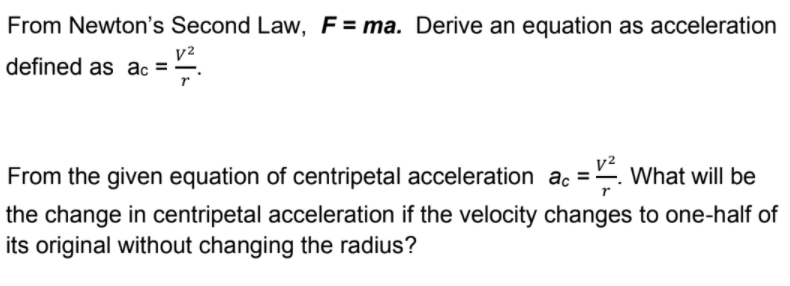From Newton's Second Law, F = ma. Derive an equation as acceleration defined as ạc = - From the given equation of centripetal acceleration ac = v2 . What will be the change in centripetal acceleration if the velocity changes to one-half of its original without changing the radius?
From Newton's Second Law, F = ma. Derive an equation as acceleration defined as ạc = - From the given equation of centripetal acceleration ac = v2 . What will be the change in centripetal acceleration if the velocity changes to one-half of its original without changing the radius?
University Physics Volume 1
18th Edition
ISBN:9781938168277
Author:William Moebs, Samuel J. Ling, Jeff Sanny
Publisher:William Moebs, Samuel J. Ling, Jeff Sanny
Chapter6: Applications Of Newton's Laws
Section: Chapter Questions
Problem 76P: The CERN particle accelerator is circular with a circumference of 7.0 km. (a) What is the...
Related questions
Question

Transcribed Image Text:From Newton's Second Law, F= ma. Derive an equation as acceleration
v2
defined as ac =
From the given equation of centripetal acceleration ac =. What will be
the change in centripetal acceleration if the velocity changes to one-half of
its original without changing the radius?
Expert Solution
This question has been solved!
Explore an expertly crafted, step-by-step solution for a thorough understanding of key concepts.
This is a popular solution!
Trending now
This is a popular solution!
Step by step
Solved in 2 steps

Recommended textbooks for you

University Physics Volume 1
Physics
ISBN:
9781938168277
Author:
William Moebs, Samuel J. Ling, Jeff Sanny
Publisher:
OpenStax - Rice University

An Introduction to Physical Science
Physics
ISBN:
9781305079137
Author:
James Shipman, Jerry D. Wilson, Charles A. Higgins, Omar Torres
Publisher:
Cengage Learning

Glencoe Physics: Principles and Problems, Student…
Physics
ISBN:
9780078807213
Author:
Paul W. Zitzewitz
Publisher:
Glencoe/McGraw-Hill

University Physics Volume 1
Physics
ISBN:
9781938168277
Author:
William Moebs, Samuel J. Ling, Jeff Sanny
Publisher:
OpenStax - Rice University

An Introduction to Physical Science
Physics
ISBN:
9781305079137
Author:
James Shipman, Jerry D. Wilson, Charles A. Higgins, Omar Torres
Publisher:
Cengage Learning

Glencoe Physics: Principles and Problems, Student…
Physics
ISBN:
9780078807213
Author:
Paul W. Zitzewitz
Publisher:
Glencoe/McGraw-Hill